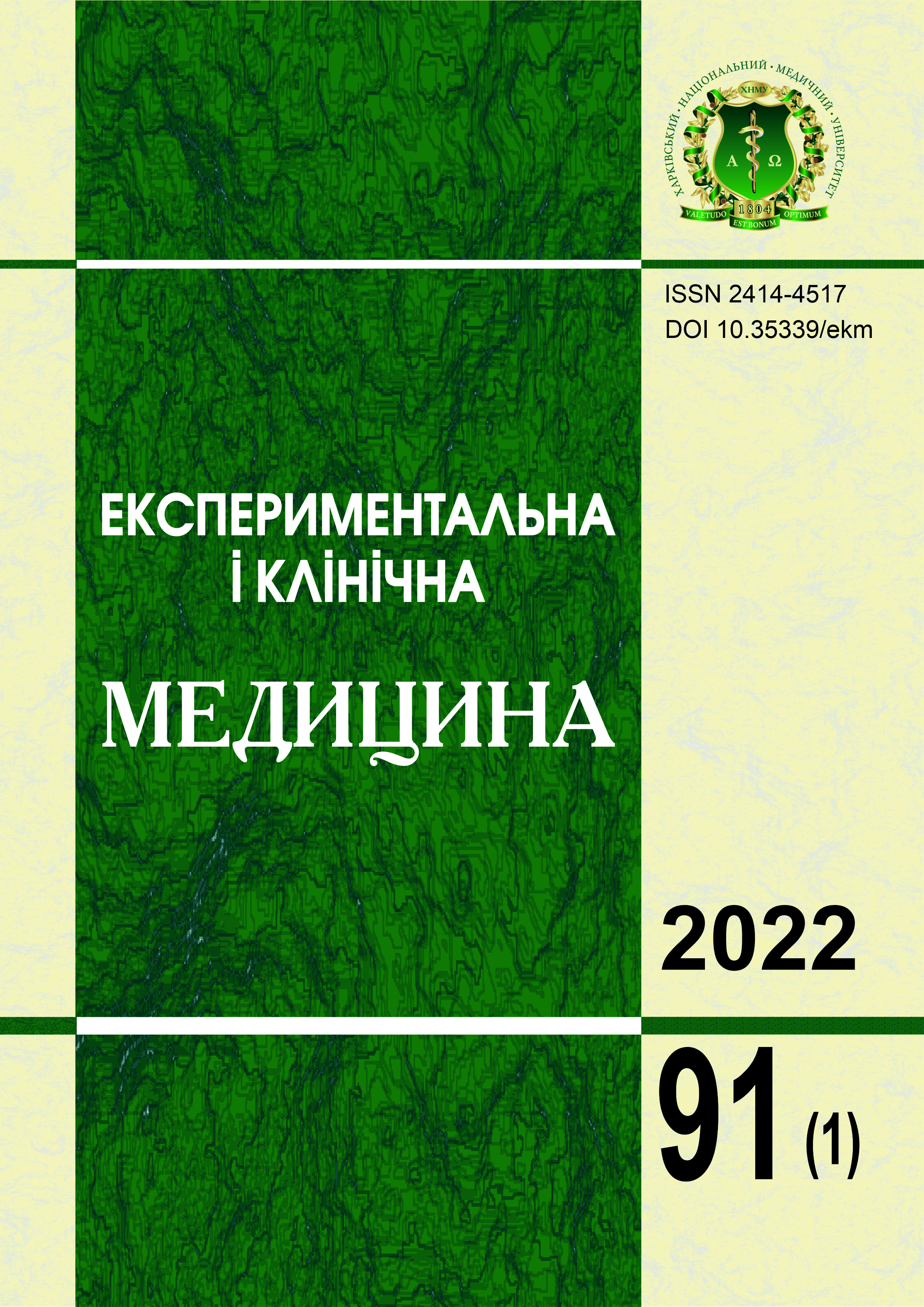Abstract
Analysis of comorbid conditions in elderly and senile patients with COVID-19 and acute intestinal infection (AII) caused by representatives of opportunistic flora, conducted on 71 patients of the infectious disease department, including 42 women (59.15%) and 29 (40.85%) men. In patients, acute intestinal infection was caused by enteropathogenic bacilli ‒ 38 (53.52%) patients, bacteria of the genus Pseudomonacea ‒ 10 (14.09%), and St. aureus ‒ 23 (32.39%). The average age of the patients was 71.48±7.53 years. Analysis of comorbid conditions and prediction of disease progression was performed according to the severity of the disease and using the Charlson comorbidity index, the ABCD scoring system, the COVID-19 severity index, and the NEWS questionnaire. It was established that the examined patients have a high propensity for a severe course of diseases with their comorbid burden. A reliable lack of relationship between the comorbidity index and the degree of severity of AKI has been proven. Patients with AII had a low to moderate risk of developing infectious complications and also required continuous supplemental oxygen support and intensive care. According to the results of a survey on the NEWS system, patients who have a constant supply of oxygen have a higher probability of the formation of severe AII (OR=7.50; CI (1.28‒43.84); p=0.02), and a lower probability in relation to the average degree of severity (OR=0.13; CI (0.02‒0.78); p=0.02). Predicting the degree of severity of an acute intestinal infection that has developed against the background of COVID-19 affects the choice of treatment methods, in particular oxygen therapy, accelerates decision-making and the effectiveness of therapy.
Keywords: acute intestinal infection, coronavirus disease COVID-19, dysbiosis, comorbid pathology, infectious complications, intestinal microbiocenosis.
References
Dhara D, Mohanty A. Gut microbiota and Covid-19 ‒ possible link and implications. Virus Research. 2020;285:198018. DOI: 10.1016/j.virusres.2020.198018. PMID: 32430279.
Sahu T, Mehta A, Ratre YK, Jaiswal A, Vishvakarma NK, Bhaskar LV, Verma HK. Current understanding of the impact of COVID-19 on gastrointestinal disease: Challenges and openings. World Journal Gastroenterology. 2021;27(6):449‒69. DOI: 10.3748/wjg.v27.i6.449. PMID: 3364282.
Zhang J, Garrett S, Sun J. Gastrointestinal symptoms, pathophysiology, and treatment in COVID-19. Genes Dis. 2021;8(4):385‒400. DOI: 10.1016/j.gendis.2020.08.013. PMID: 33521210.
Mishchuk VH, Kupnovytska IH, Hubina NV, Martyniv IV, Belehai RI. Manifestations of digestive system in acute period of coronavirus disease. Actual Problems of the Modern Medicine: Bulletin of Ukrainian Medical Stomatological Academy. 2020;3(71):138‒42. DOI: 10.31718/2077-1096.20.3.138. [In Ukrainian].
Villapol S. Gastrointestinal symptoms associated with COVID-19: impact on the gut microbiome. The Journal of Laboratory and Clinical Medicine. 2020;226:57‒69. DOI: 10.1016/j.trsl.2020.08.004. PMID: 32827705.
Tuty Kuswardhani RA, Henrina J, Pranata R, Anthonius Lim M, Lawrensia S, Suastika K. Charlson comorbidity index and a composite of poor outcomes in COVID-19 patients: A systematic review and meta-analysis. Diabetes Metab Syndr. 2020;14(6):2103‒9. DOI: 10.1016/j.dsx.2020.10.022. PMID: 33161221.
Salunke AA, Warikoo V, Kumar Pathak S, Nandy K, Mujawar J, Mendhe H, et al. A proposed ABCD scoring system for better triage of patients with COVID-19: Use of clinical features and radiopathological findings. Diabetes Metab Syndr. 2020;14(6):1637‒40. DOI: 10.1016/j.dsx.2020.08.019. PMID: 32892061.
Huespe I, Carboni Bisso I, Di Stefano S, Terrasa S, Gemelli NA, Las Heras M. COVID-19 Severity Index: A predictive score for hospitalized patients. Med Intensiva. 2022;46(2):98–101. DOI: 10.1016/j.medin.2020.12.001. PMID: 33478781.
Greenhalgh T, Treadwell J, Burrow R, Roberts N. NEWS (or NEWS2) score when assessing possible COVID-19 patients in primary care? The Centre for Evidence-Based Medicine. Evidence Service to support the COVID-19 response. 8 Apr 2020. Available from: https://www.cebm.net/covid-19/should-we-use-the-news-or-news2-score-when-assessing-patients-with-possible-covid-19-in-primary-care
Samchuk OO, Kapustynska OS, Skliarov YeIa. Prevalence of some comorbid conditions at coronovirus disease. Clinical and experimental pathology. 2022;20(4):66‒73. DOI: 10.24061/1727-4338.XX.4.78.2021.8. [In Ukrainian].
D’Amico F, Baumgart D, Danese S, Peyrin-Biroulet L. Diarrhea During COVID-19 Infection: Pathogenesis, Epidemiology, Prevention, and Management. Clinical Gastroenterology and Hepatology Journal. 2020;18(8):1663‒72. DOI: 10.1016/j.cgh.2020.04.001. PMID: 32278065.
Kostakis I, Smith G, Prytherch D, Paul Meredith , Price C, Chauhan A. The performance of the National Early Warning Score and National Early Warning Score 2 in hospitalised patients infected by the severe acute respiratory syndrome coronavirus 2 (SARS-CoV-2). Resuscitation. 2021;159:150‒7. DOI: 10.1016/j.resuscitation.2020.10.039. PMID: 33176170.

